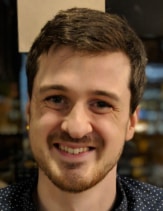Will Foxall is a creative technologist for the South West Creative Technology Network, based at the Watershed in Bristol, UK
 What sparked your initial interest in physics?
What sparked your initial interest in physics?
When I was about seven, I went on a tour of Jodrell Bank Observatory with my primary school headteacher and her kids. I remember loving every bit of it, wanting to know how everything worked and then coming home with a pack of glow-in-the-dark stars with which I covered my bedroom ceiling. I even copied some of the constellations on the packet, so that my room had its own Plough and Cassiopeia.
Over the next few years as my dad’s photography business became increasingly digital, I cobbled together and upgraded my own computer from the outdated parts. It frequently broke and I developed a knack for problem-solving to get it up and running again.
As a sixth-form student I was fortunate enough to have really inspiring maths and physics teachers, Donald Steward and Lisa Greatorex, who made these subjects not only interesting, but fun. At the same time, Brian Cox started making appearances on BBC’s Horizon and, while I wouldn’t attribute too much of my decision-making process to a TV presenter, I guess you could class me as one of the early physics students in the “Brian Cox Effect”.
What did your physics degree focus on? Did you ever consider a permanent academic career?
While I discovered a fascination for particle physics and quantum mechanics in particular, I never lost that childhood wonder about space. For my final-year project, I found myself peering into the sky through the University of Bristol’s optical telescope on the roof of the physics department. We were asked to calibrate the sensor and then test it with some observations, which granted us special access to the roof at night. I remember getting particularly twitchy during consistently cloudy nights in the month before our project was due, which nearly jeopardized our final mark. But we got a window of clear nights at the last minute and managed to secure a first for the project.
At the end of my BSc I found myself keen to apply some of my knowledge in some different fields. My best marks were in the practical elements of my degree such as my final-year experiments and so further research was not for me. Retrospectively, perhaps the most useful bits of my degree were the programming and Physics World science-communication modules that the university was running.
How did your interest in the arts, especially television and film technologies, emerge?
I come from a very creative family. My parents are both art teachers turned photographer and graphic designer, and my sister has worked with a host of performing-arts organizations. Some of that creativity must have rubbed off on me along the way as I spent my teenage years playing music and creating short films with my friends.
After graduating from university, I was looking for opportunities that could use the analytical approach gained from my physics degree, while reconnecting with the arts that I enjoyed as a teenager. As a result, I joined Bristol’s television industry as a runner and worked my way up through a number of technical roles, looking after some exciting natural history shows for the BBC and multi-screen cinemas in Japan.
When 360 video and VR began to boom, I started app development which introduced me to some of the innovative creative technology work that happens in Bristol.
What does your current role as “creative technologist” entail? What projects are you working on at the moment?
The South West Creative Technology Network is a partnership between four universities (UWE, Bath Spa, Falmouth and Plymouth) as well as the Watershed media centre in Bristol and the Kaleider production studio in Exeter. It’s a knowledge-exchange programme that creates connections across academia and industry in the South West to create innovation in three areas of interest; immersion, automation and data. As a creative technologist, I get involved in all sorts of fascinating conversations with research fellows and prototypers working on these themes. I try to identify the technical hurdles they may encounter and then help work out the best route to tackle them as they arise.
The projects we’re working on include the use of motion-capture data to improve mobility in the elderly, the creation of new musical instruments in virtual reality and extending the story of a theatrical performance beyond the confines of the stage.
How has your physics background been helpful in your work, if at all?
I’d say that, in particular, I improved two skills through studying physics, and they have been invaluable in the path I have chosen since my degree. First, a solid understanding of some of the core concepts that many specific areas of physics build on, whether that’s mathematical methods or how to derive equations. Second, and the most transferable skill, is the ability to break a problem down into a variety of approaches and then systematically solve it.
Any advice for today’s students?
If you have an idea of where you want your interests to take you, then stick to that goal and go for it. That’s what got me to the university I wanted to go to, studying the degree I picked. However, if you don’t, that’s where it gets really exciting; most of my decisions since graduating have been what I consider the “best choice available to me at the time”, which has led me to where I am now. And I’m very happy with that!



